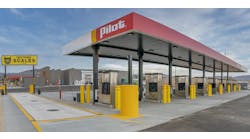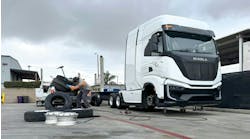There are now tens of thousands of propane autogas-powered commercial vehicles on the roads in North America, completing tasks such as delivering baked goods or bottled water, dropping off packages, and transporting students to school. While it may not be obvious, those propane autogas vehicles are producing fewer harmful emissions than their traditionally-fueled counterparts. And, new propane autogas engine and fuel technologies are lowering emissions even further.
Considerations when switching from diesel
Even though today’s diesel engines are cleaner than those of years past, there are still reasons to consider alternatively-fueled vehicles such as propane autogas. Diesel engines are cleaner largely through complexity, like expensive equipment and high-maintenance systems. Without multiple additional ancillary devices, diesel engines would not be able to meet Environmental Protection Agency (EPA) emissions standards.
Propane’s low-carbon chemical properties allow it to power an engine while reducing the emissions released into the atmosphere. Engines fueled by propane autogas require less oil by volume than their diesel counterparts, and do not need additional emission fluids or extra valve adjustments. Additionally, propane vehicles follow the same regular maintenance as conventionally-fueled models. This includes recommended oil change intervals and basic maintenance like changing and inspecting spark plugs, air filters, batteries, etc.
Since preventive maintenance recommendations are similar to that of diesel engines and there are fewer aftertreatment considerations, this could mean reduced overall maintenance for a fleet using propane autogas vehicles.
Environmental and health factors
Propane is a clean-burning, low-carbon fuel with three parts carbon and eight parts hydrogen. It is non-toxic and poses no harm to groundwater or soil. When compared to diesel and gasoline vehicles, vehicles fueled by propane autogas emit fewer greenhouse gases and total hydrocarbon emissions, and virtually eliminate particulate matter.
Propane autogas is also naturally lower in nitrogen oxides (NOx), emissions which are federally regulated due to their negative impact on human health and the environment. They can trigger health problems such as asthma, bronchitis, and other respiratory issues, and environmental problems such as acid rain and deteriorated water quality. According to a University of California Riverside study, diesel-fueled medium and heavy duty vehicles are the number one source of NOx emissions in almost every single metropolitan region in the U.S.
Propane autogas trucks reduce drivers’ exposure to the harmful particulate matter in diesel exhaust, which is known to aggravate asthma and is identified as a carcinogen by the World Health Organization. Engine noise is also reduced in propane autogas vehicles, allowing drivers to focus more on the road ahead.
To encourage manufacturers to be even more environmentally friendly, the California Air Resources Board (CARB) established optional low-NOx standards below the EPA’s 0.2 grams per brake horsepower hour (g/bhp-hr) standard.
Manufacturers may choose to certify engines to the California Optional Low NOx Standards of 0.10, 0.05, or 0.02 g/bhp-hr. In 2018, ROUSH CleanTech received CARB certification for its 0.02g ultra-low NOx 6.8L V10 3V propane engines for Class 4 through 7 vehicles. When fueled by traditional propane autogas, this engine is 90 percent cleaner than national emissions standards.
Renewable propane
In addition to traditional propane, propane autogas engines can be powered by renewable propane, a non-fossil fuel produced from 100 percent renewable raw materials such as waste, residue, and sustainably produced vegetable oils. There is growing interest in renewable propane due to its near-zero emission levels, reduced greenhouse gases, and ability to help meet growing demand for cleaner products. It can be used as a replacement fuel because, chemically, it is nearly identical to conventional propane. Since it is produced from renewable, raw materials, renewable propane has a lower carbon intensity than conventional propane and is “cleaner” than other energy sources.
The Propane Education & Research Council (PERC), a nonprofit organization that provides propane safety and training programs, is committed to testing renewable propane, including blends with conventional propane and standard development. The organization has been informing OEMs of potential engine use and creating awareness of the fuel for producer, seller, transporter, and end user.
“As the next generation of sustainability, renewable propane is an energy source that will play a critical role in caring for the environment,” says Steve Whaley, director of autogas business development at PERC. “Renewable propane has all the benefits of conventional propane autogas – it’s clean, affordable, and provides fleets with the same performance and reliability they’ve come to expect – but at the point of combustion, it’s carbon neutral.”
Many companies around the world are developing renewable propane production technology, with some in commercial volume as a byproduct of renewable diesel plants. Renewable propane is produced in several European and Asian countries, and several U.S. refineries in California, Texas, and Louisiana have existing capacity to produce renewable propane as part of their renewable diesel production systems. The pricing is also on par with traditional propane. As demand grows in places like California, the producers of renewable propane will begin to develop the infrastructure to distribute this fuel efficiently.
Renewable propane is already available, and many experts predict the entire worldwide demand can be met with renewable propane by 2040. Federal alternative fuel tax credits are available for fleets using propane or renewable propane, although propane already has the lowest total operating costs of any fuel, conventional or alternative.
The latest low NOx propane engine technology, coupled with renewable propane, may be a cost-effective method to help reduce emissions for a fleet.




